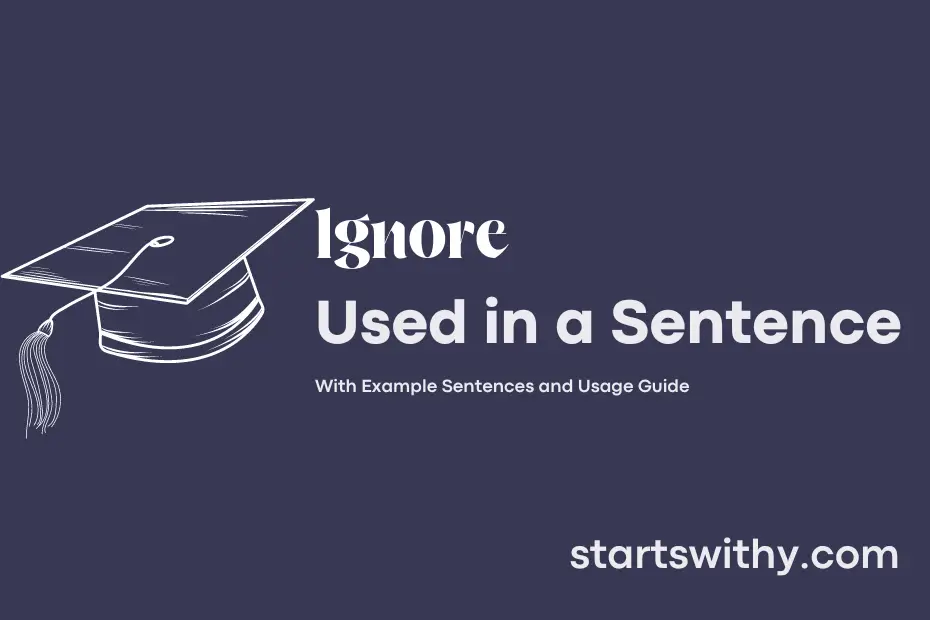Have you ever found yourself purposefully disregarding or paying no attention to someone or something? This act of intentionally ignoring is a common behavior that we all engage in at some point in our lives.
When we ignore someone or something, we choose to overlook or neglect its presence or significance. It can be a way to avoid confrontation, dismiss unwanted information, or simply focus on more pressing matters. Ignoring can take various forms, from refusing to acknowledge someone’s presence to turning a blind eye to a problem.
7 Examples Of Ignore Used In a Sentence For Kids
- Ignore the loud noises and focus on your work.
- It’s important to ignore distractions during class.
- Remember to ignore any negative comments from others.
- Let’s practice how to ignore things that bother us.
- We should learn to ignore unnecessary things and stay focused.
- Don’t forget to ignore any bad behavior from classmates.
- When someone is being mean, just ignore them and walk away.

14 Sentences with Ignore Examples
- Ignore the distractions during your study sessions to stay focused and productive.
- Make sure to ignore peer pressure and stay true to your values and beliefs.
- Ignore the negative comments and keep striving towards your goals.
- When facing difficulties, try to ignore the doubts and stay determined.
- Ignore social media notifications when you need to concentrate on your assignments.
- It’s important to ignore drama and remain focused on your studies.
- Remember to ignore the urge to procrastinate and stick to your study schedule.
- Ignore the temptation to skip classes and prioritize your education.
- Don’t let self-doubt hold you back, learn to ignore your inner critic.
- Ignore the urge to overspend and manage your finances wisely as a college student.
- Ignore the fear of failure and keep pushing yourself out of your comfort zone.
- When making decisions, it’s crucial to ignore the fear of judgment from others.
- Ignore the pressure to conform and embrace your uniqueness and individuality.
- Ignore the comparisons with others and focus on your own personal growth and achievements.

How To Use Ignore in Sentences?
Ignore can be used in a sentence to show that you are intentionally not paying attention to or disregarding something. For example, “I will ignore the distractions and focus on my work.”
When incorporating ignore into a sentence, it is important to place it before the action or thing being disregarded. This helps to clearly convey that you are intentionally choosing to overlook or pay no attention to that particular item.
Another example of using ignore in a sentence is: “It is best to ignore negative comments and focus on the positive aspects of your work.” In this sentence, ignore indicates that it is advisable to not let negative comments affect your focus and emphasize positivity instead.

It is important to remember that using ignore in a sentence implies a deliberate act of overlooking or disregarding something. It can be used in various contexts, such as dealing with distractions, criticism, or unwanted behavior. By incorporating ignore effectively in your sentences, you can clearly communicate your intent to pay no attention to certain things and maintain your focus on what truly matters.
Conclusion
In conclusion, it is essential not to ignore problems or red flags that arise in any situation. Ignoring these warning signs can lead to more significant issues down the line. By addressing issues promptly and effectively, individuals can prevent potential complications and ensure a smoother resolution.
Remember that choosing to ignore a problem does not make it disappear. It is crucial to confront and tackle challenges head-on rather than turning a blind eye. By actively addressing concerns and seeking solutions, individuals can proactively prevent escalation and maintain a better overall outcome.



